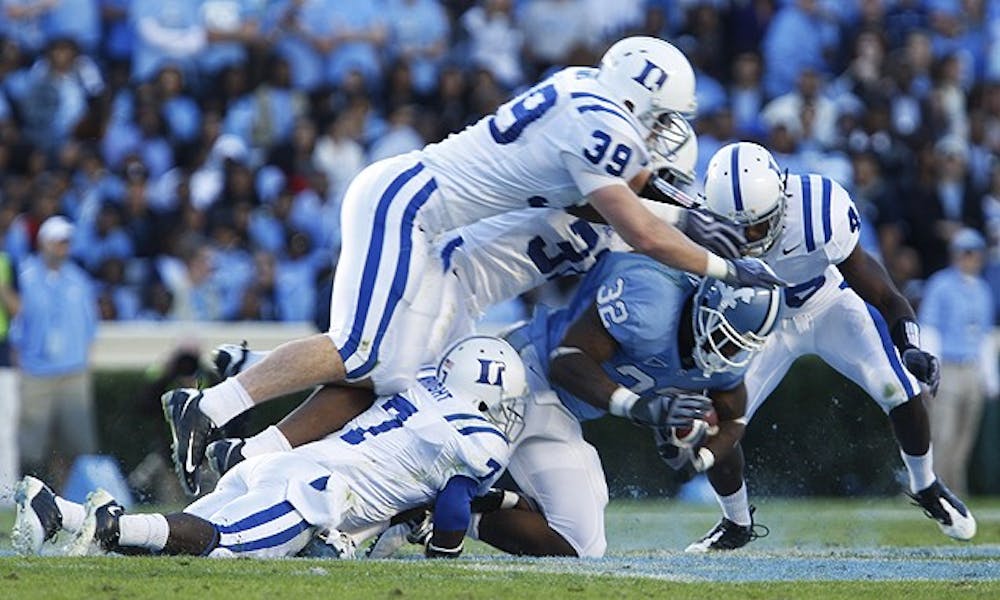CHAPEL HILL — Three steps forward, one enormous step backward.
Riding a three-game winning streak into its rivalry matchup with North Carolina, Duke ran into a brick wall Saturday at Kenan Stadium in the form of the Tar Heels and their second-string running back, Ryan Houston. Rushing for 164 yards—more than the Blue Devils’ total offensive output of 125 yards—Houston and the rest of the Tar Heels (6-3, 2-3 in the ACC) physically manhandled Duke (5-4, 3-2) en route to a 19-6 win that seriously dents the Blue Devils’ fledgling hopes of qualifying for a bowl game.
“We really were fortunate to have a chance there in the fourth quarter to win the game, because bottom line is we got whipped,” Duke head coach David Cutlcliffe said. “My hat is off to them for a well-played ball game.”
As Cutcliffe referenced, sloppy play by both sides through the first three quarters meant that much of the game was a close kicking battle, with North Carolina up 9-6 entering the final period. But without the services of starting kicker Will Snyderwine, who tweaked his quadriceps during pregame warmups, Cutcliffe elected to go for it instead of try a 52-yard field goal on a key 4th-and-4 from the UNC 35-yard line with just over 13 mintues remaining. On the play, quarterback Thaddeus Lewis’s pass was deflected at the line by a North Carolina linebacker Bruce Carter, and the Tar Heels took over on downs.
“If Bruce doesn’t get his hand on the ball, it is a completion,” Lewis said. “It’s kind of like chess, you have to gamble sometimes. We did, and they came out on top on that play.”
Cutcliffe said after the game that he likely would have gone for the field goal had Snyderwine—who successfully kicked five field goals last week at Virginia—been available, but he didn’t feel comfortable with backup kicker Nick Maggio’s range or the decision to punt in the situation. After taking possession, North Carolina stormed down the field on a 12-play, 65 yard drive capped by a 3-yard Jheranie Boyd touchdown scamper that put the Tar Heels up 16-6 with 6:57 to play.
“I wanted to be aggressive, and I went out there and told our defense that I wouldn’t have done that if I didn’t believe in them,” Cutcliffe said. “To Carolina’s credit, I guess they converted two or three third downs on that drive and went down and scored. They did what they had to do.”
But even before the fourth quarter, North Carolina asserted its dominance in the run game, maintaining possession for long stretches and making it incredibly difficulty for the high-octane Duke offense to hit its stride. Houston, who is normally the Tar Heels’ second-string and short-yardage back, stepped up in the first quarter after a shoulder injury sidelined starter Shaun Draughn and utilized a punishing, physical running style to average 4.4 yards per carry on a career-high 37 rushes. North Carolina’s successful smashmouth game plan led to a huge imbalance in time of possession—the Tar Heels had the ball for 38:33 compared to Duke’s 21:27 minutes of possession—and effectively wore down the Duke defense by the fourth quarter.
On the other side of the ball, the Tar Heels did an outstanding job of pressuring Lewis and tightly covering Duke’s receiving corps. Lewis was sacked three times but was pressured heavily throughout the game, often leading him to be flushed out of the pocked after the Tar Heels overloaded a blitz to a particular side. Further complicating matters, tight man defense on Duke’s wide receivers meant that the Blue Devil wideouts struggled to get separation in time for Lewis to make a play. Duke’s output of 113 passing yards was the team’s worst showing in that category all season.
“They just have great guys up front,” Lewis said. “Those guys did a great job. Pressing up man, routes take a bit longer to develop and things like that, so they did a great job of scheming it up.”
Duke’s sole bright spot was in the kick return game, where solid runbacks from wide receivers Johnny Williams and Conner Vernon accounted for 132 yards and solid starting field position on a number of drives. The Tar Heel defense, however, made it tough for Duke to even threaten for a touchdown on offense. Perhaps the closest Duke came to a six-point score was Leon Wright’s interception return in the third quarter, but the senior corner was pushed out of bounds along the left sideline at the North Carolina 37-yard line.
“I was hoping Leon was going to score with it,” Cutcliffe said. “I was trying to block for him, all I could mentally, because we were struggling so much offensively.”
But in the end, Duke’s inability to stop the physical rushing attack of the Tar Heels was its main undoing. With the bruising wishbone offense of Georgia Tech—ranked second in the country in rushing offense—on tap next weekend, the Blue Devils must learn from their tough rivalry game loss.
“We have to totally immerse ourselves in the learning experience and getting better, and go out now and try to play our best football game of the year next Saturday,” Cutcliffe said.
Get The Chronicle straight to your inbox
Signup for our weekly newsletter. Cancel at any time.

